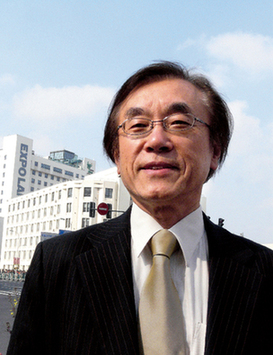Building a welfare state
- By Noriyoshi Ehara
 0 Comment(s)
0 Comment(s) Print
Print E-mail China.org.cn, October 1, 2012
E-mail China.org.cn, October 1, 2012
In the 2012 London Olympic Games, China ranked high on the medal tally. Four years ago in the Beijing Olympic Games, it won the largest number of gold medals. In the Olympics, all countries compete under the same rules, despite race, religion, and political, ideological and cultural differences.
|
|
|
Noriyoshi Ehara [File photo] |
In 2010, China surpassed Japan in terms of overall GDP, becoming the world's second biggest economy after the United States. In 2011, its per-capita GDP reached US$5,414, four times its 2003 level. This meant China had become a middle-income country, although the figure was only one eighth of Japan's per-capita GDP at that time.
In addition, by holding the Beijing Olympic Games in 2008 and the Shanghai World Expo in 2010, China has attracted great world attention and turned into a major player in world affairs.
In technology and science, China has made major achievements including the docking of the Shenzhou-9 spacecraft with Tiangong-1 lab module, the Chang'e moon probe project and the self-developed high-speed railway network.
However, there has not always been good news over the past decade. A series of unprecedented disasters also emerged, such as the 8.0-magnitude earthquake in southwest China's Wenchuan County in 2008, the deadly landslide in northwest China's Zhouqu County in 2008, the 2003 SARS outbreak, as well several food safety crises and numerous concerns about air and water pollution.
Moreover, over the past 10 years, China has placed itself in an increasingly vulnerable position to be affected by the next global economic crisis.
Over the past decade, China's development has shifted markedly from an all-out push for economic development to a more thoughtful society which addresses the concerns of its citizens.
During his famous 1992 Southern Tour, late Chinese leader Deng Xiaoping made a landmark speech and proposed the conception of "socialist market economy", putting the focus on "economy". However, over the past 10 years, the Communist Party of China and the Chinese government have repeatedly stressed the principle of national development is building a harmonious society with scientific outlook on development. The "harmonious society" refers to a society with a balanced social structure.
The essence of a "harmonious society" is "putting people first", which in practice, means improving people's livelihoods. Over the past years, the authorities have been working to further improve public healthcare, social welfare, education and employment services. In 2006, the 2,600-year-old agricultural tax was abolished. In 2007, all students in rural areas were exempted from various fees for their nine-year compulsory education. Great efforts have been made to accelerate urbanization. Thus, China has made major strides in narrowing the income gap.
In fact, improving people's livelihood is another way to fulfill the latter half of the "common prosperity" theory proposed by Deng Xiaoping, who said "our policy is to allow some people and some regions get rich first in order to stimulate and help the backward areas". Beginning in 2002, the Chinese government carried out the strategy of reinvigorating China through human resource development and worked hard to promote professional education, which will surely further improve people's livelihoods.
China has developed strengths in many fields over the past 10 years. In the future, I think it will become a greater world power with bigger achievements in urbanization, cultural development and innovation, which will be seen in the overseas expansion of Chinese businesses, domestic projects to improve people's livelihood, the increase of the country's projection of soft power and it's the 'pursuit of innovation and opening up' as a succession of Deng's policy of reform and opening up.
The author is a chief economist at the Institute of International Trade and Investment in Japan. He formerly served as the Beijing director of the Japan External Trade Organization (JETHRO) and the director of the Japan Pavilion at the 2010 Shanghai World Expo.
Opinion articles reflect the views of their authors, not necessarily those of China.org.cn.








Go to Forum >>0 Comment(s)